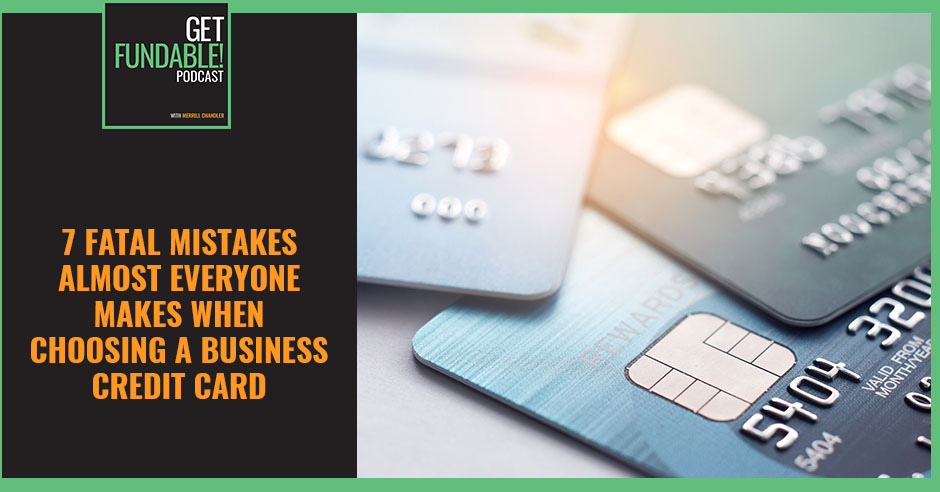
Obtaining a business credit card is a much more tedious process than what people may think. Without knowing it, you may have already stepped on multiple landmines that will ruin your chance of getting one. And even if you already have one, there is a probability that you have the wrong one. In this episode, Merrill Chandler reveals the seven ways in which you may have miscalculated business credit cards and what you can do to fix it so that you can continue on with your financial journey. He breaks down some important errors to watch out for and the essential questions you need to be asking before making this important decision.
—
Watch the episode here:
Listen to the podcast here:
7 Fatal Mistakes Almost Everyone Makes When Choosing a Business Credit Card
Obtaining a business credit card can be tricky. Today, we’re going to cover the ways in which you may have completely miscalculated somewhere in the process…even if you didn’t realize it! There are several landmines out there that you should avoid stepping on, but I’m going to discuss the 7 which are the most common. Not only is this about the errors to watch out for, but what to do about it as well so that you can continue on your journey in becoming fundable. Now, let’s take a look at the common practices out there that many individuals blindly back into without knowing. They are in no order of importance, since I consider all of them to be dangerous. Now, if you’re rather new here…go back and binge the previous episodes so you can be up-to-date on all of the amazing intel that you need to become fundable and make the right business decisions!
—
Enticed To Get A Business Credit Card
To begin, one of the most common problems people run into when buying a business credit card, and the first one that we will be covering today, is becoming enticed to obtain one that reports to your personal profile. There are many out there, so for example, we are going to use the Spark Card offered through Capital One. They offer a few options, but any business card offered through Capital One is a big no-no because even though they claim to be a business card…they actually report to your personal profile. If you have any of the Capital One cards (i.e. the Spark Card), it has ‘business’ written all over it. It even does on the statements! But as previously stated, this is not a true business credit card because it reports to your personal profile.
As business owners, entrepreneurs, and real estate investors, we want to use our business credit cards because we get points, miles, the ability to track our write-offs, etc. This is the reason why many will dive into getting a business card without thinking twice. The problem is that every time you use it, your personal profile is affected. Have you ever noticed that when you raise your balances and charge up on your personal cards, your score goes down? Your personal fundability™ goes down as well. You may think you’re being a good borrower and businessman/woman…but it is secretly harming you. And this isn’t just about Capital One. The same applies to American Express, Discover, and more! Every time you use it for business reasons, you’re lowering your score, your fundability™, and your chances of ever looking attractive and professional to a business lender. But don’t worry! We’ll solve all of this as you read to the end of this episode.
Did you know there's a difference between a credit card and a charge card? #GetFundable Share on XUsing Suggested Offers On Websites
The next way that we pull the rug out from underneath us is if we decide to use the suggested offers that are mentioned on websites. Credit Karma is one of the most famous websites…but for your personal and business side. But…they aren’t actually looking out for your fundability™. The cards that they recommend are listed in the order of how much money they make by referring you. When you click on that icon or link, they’re tracking it. And if you actually fill it out, they get credit for it! They’re not trying to help you, and they certainly aren’t supporting your desires to build good banking relationships with lenders so that you can get credit cards, business credit lines, or business loans. When you search for business cards on Credit Karma, the vast majority that they offer you are, once again, going to report to your personal. Their website lures you in by giving you a free score and/or neat little articles to read. If you apply for one of the cards, the likelihood of harming your fundability™ is very high…and all because you blindly followed their suggested offers.
Responding To Mailed Offers
The next possible and very dangerous land mine we can step on is if you respond to mailed offers. Let me ask you this…how many of you are getting 1-5 offers a week from various lenders claiming that they have this big, special offer to give you a $300 credit just for opening up a card? There are all kinds of offers similar to this! And they almost always have a code within them that you have to respond to. It acts as your promo code, activation code, or your user ID.
The issue that many people won’t realize is that they’re trying to hide the fact that they are tracking you. Think of it this way…that tracking code puts you on a list of people that are basically seen as susceptible or gullible. You’ll look like a simple consumer that does not have the safety of their fundability™ in mind. I like to call this a gray list, and it’s filled with people that aren’t taken seriously. Those actual inquiries count against you more than regular inquiries would. I like to think of it as a party that everyone wants to get into…but once you are, they shut the door behind you. You get to enjoy it, but nobody else is able to follow you. That’s what these promo codes are designed to do, and it’s why mailing offers are treacherous to your fundability™!

Wrong Business Credit Card: Charge cards are less valuable on your profile on both personal and business. It’s less valuable than a credit card.
Choosing A Low-Value Card Over A High-Value Card
The fourth dangerous mistake to watch out for is choosing a low-value card over a high-value card. In one of our past episodes, we discuss the different tiers of banks. So if you missed it, go back and watch that one first. There are four levels of banks. Tier 4 lands at the bottom, which is why I like to call them predatory lenders. It’s like hard money. You will get docked by FICO for having a consumer finance account on your profile by having a tier four account. The top four banks (Wells Fargo, Bank of America, Citi, and Chase) are all sitting at tier 1. Regional banks belong in tier 2, which leaves credit unions, community banks, and both national and local credit unions in tier 3.
Even though this may be obvious to you, tier 4 is the worst and tier 1 is the best. The closer you can get to tier 1, the more valuable you are to future lenders…especially business lenders. When you choose a low-value card because of an offer, it won’t contribute as much to your profile. Two examples of these are Amex and Discover, which have a lower value than Chase or Wells Fargo. This is a secret that almost nobody realizes! It’s not your fault…but now you know. You want the highest value cards possible to establish a relationship.
Don’t you want an amazing borrower-lender relationship with the top four banks that have the lowest possible rates in the country? The answer is yes! A lot of people blindly follow an offer that leads them to a low-value card just because, let’s say, they have miles or points. But I’m telling you right now…those points go away. And once they do, they won’t serve you at all. A bonus fact is that you can still have high-value travel cards with the top four! So always make an effort to seek out a high-value card rather than a low-value one.
Home Depot Card
The next possible way of harming your profile is if you go and get a Home Depot Card. A lot of real estate investors do in fact obtain one, but don’t worry, it’s no harm, no foul. This is why we’re all here together…to help each other out in realizing things like this! In this instance, the hidden landmine is the fact that a Home Depot card actually damages your personal profile because it resides in tier 4 and FICO counts it against you. They label it as a consumer finance account and then proceed to take points away from your score. But did you know that Home Depot and Lowe’s all have business accounts? We want to make sure those business accounts never report to your personal profile. Given all of the things we’ve talked about, the mistake we may have made is putting it on our personal side, when in fact it belongs on the side. This applies to Lowe’s cards, Staples cards, Best Buy cards, etc. I even happen to know individuals who have a $250,000 business Home Depot card! It’s because he puts $50,000-$60,000 a month on that card. That would absolutely destroy your personal profile because your balances would go up and your scores would plummet. Sometimes it carries balances because you’re waiting for a flip to occur.
Obtaining the wrong version of the card (personal instead of business) is yet another landmine to dodge. The other thing—and this is important—is that when you’re considering any card at all, you want to find out if it has a business equivalent. For example, you need to remember to ask about the possible business version or about having a fundable entity. We need a Qualified Fundable Entity (QFE) to put these different business credit instruments on. And please remember to alwasy choose the business version of the card that won’t go anywhere near your personal profile.
Did you know there's a difference between a credit card and a charge card?#GetFundable . Share on XCredit Card Versus Charge Card
This next problem in our line-up can unfortunately be very subtle. Did you know…there’s actually a difference between a credit card and a charge card? Think of it this way: a credit card offers you a credit limit. There’s a maximum amount that you can use, and then you pay it down. On the other hand, a charge card literally has no limit. Just charge it up and pay it off at zero! It also has a 21 to 30-day free loan. Here is where we run into our problem. Charge cards are a lot less valuable on your profile…both personal and business. Since there’s no existing limit, they can’t calculate how much you’re using of that limit. With your utilization, FICO doesn’t have enough data points to measure it, so it doesn’t count as a valuable asset. Credit cards are far more valuable than charge cards, but a lot of us don’t realize that there is a difference between the two. It is so vital that you know when it comes to making this important decision…you want to choose the credit card option.
Not Asking Enough Questions
So how do we move forward and continue to make the best choices for our fundability™, all while fixing the problems that we already have? First of all…every road leads to vetting. Every problem that we’ve covered today, no matter which area they’re in, would be handled simply by vetting the credit card. What do I mean by vetting a credit card? To vet something is to examine it carefully based on certain criteria. Examples of our criteria are all mentioned above. Is it a charge card or a credit card? Does it report to personal or business? Is it a high-value or a low-value card? Those are the ones that we’ve considered so far.
One of the great business credit instrument offers out there comes from American Express. American Express isn’t as valuable as Chase, Wells Fargo, Citi, or Bank of America. So we don’t want it on our personal because of the charge card vs. credit card aspect. American Express should only have one charge card, but I’m not 100% sure, since this game changes all the time! But again, this final section is about me teaching you guys how to vet. This way, you can go to today’s and tomorrow’s website and know the exact questions to ask the customer service reps. The thing you want to watch out for is if it doesn’t include “credit card” in the title of the card…it’s likely a charge card. So when you call American Express’ customer service representative, the first words out of your mouth should be something like, “I’m interested in your American Express Blue credit card,” and then you’re going to proceed to ask the questions listed right above. Just the three! Find out if it is a credit card with a limit or a charge card that you would have to pay off to zero. And let them fully answer the question. What I have found…is when it says “credit card,” then it does in fact have a limit, which is a big thumbs up!
The next vetting question is to determine where the card will report to…on your personal or on your business side. But more often than not, this is where many will run into a problem. You’re asking questions that literally all of my clients and students already ask. The customer service representatives are not prepared most of the time to answer these questions because most people don’t know how to ask them. This is why you’re on my insider secret loop! So when you ask them, you simply want to say, “Does this report to my personal credit report?” Next, you need to follow up that question with, “I know you need to pull a credit report on me, but that’s not what I’m talking about.” Most times they will simply say that it goes to your credit report, because they’re thinking of where the inquiry is being pulled. We want to acknowledge, “I’m not talking about pulling an inquiry. I know you’re going to check my credit.” Use these words instead, “Each month, does this credit card report to TransUnion, Experian, and Equifax on my personal credit profile, and paid-as-agreed on my personal reports?” You need to use very precise language like that for them to understand what you’re actually asking. Do not confuse pulling an inquiry from reporting to the bureaus.

Wrong Business Credit Card: FICO doesn’t downgrade your business score by having a Home Depot on the business side. It does downgrade your personal score and profile when it’s on the personal side.
The final question is whether it is a low-value card or high-value card. Amex is not like the four tier 1 banks…it is instead a lower value card. If you haven’t already, I will be giving you a way to look up more of this information, which will be your gateway to becoming a total professional in this arena. Those are the three main questions that you will be asking…charge card vs. credit card, personal side vs. business side, and low-value vs. high-value.
Let’s say you’re calling up Home Depot and ask, “Home Depot, does this card report on my personal?” If they let you know that it does, you can respond with, “Do you have a business equivalent? Or a business credit card? And is it a credit card or a charge card?” Do you see how these questions flow? They might say, “We do have a business version of this. It doesn’t report to your personal.” And while that’s a low-value card on the personal side, it’s what you need to do for your business on the business side. FICO doesn’t downgrade your business score by having a Home Depot on the business side, but it does downgrade both your personal score and profile when it’s on the personal side. This is why you should continue to ask the questions.
Now, here’s the magic! If you do this, it will never go wrong. You must ask these questions of each representative, whether it’s Wells Fargo, Chase, Home Depot, American Express, whomever. You ask these questions until you get the same set of answers three times! If one of them say, “Yes, it reports to your personal,” but then the next one says, “No, it does not report to your personal,” then it becomes a problem. This is why you need to keep asking until you get the same answer three times and nothing less. This makes it way more likely to be true.
I’ve been doing this a long time…and so I know that it is likely to be true if three different customer service representatives agree on the same set of answers. So remember those three questions that we’ve covered today, and also the fact that you should never stop until you receive the same answer from three different people. This is the valuable education you’re receiving from my show, bootcamp, book, and more! These people will keep certain things from you because they want to sell credit cards. The way you stop ruining your chances of succeeding with business credit cards is simply to vet. That’s the name of this game!
The way you stop ruining your chances of succeeding with business credit cards is to vet. #GetFundable Share on XIf you would like to find out more, go to GetFundableBook.com. The book is free! You only have to cover shipping and simply tell me where to send you the copy. Secondly, if you want to know the strategies of what is necessary to build both a fundable personal profile and business profile…then come to my bootcamp! It’s at GetFundableBootcamp.com. It’s basically a full sixteen hours that we spend discussing strategies just like the ones we did today. So go to the website and let’s get you enrolled in the next bootcamp, and I promise that you won’t believe how inexpensive it is to get this powerful knowledge! It is my pleasure to always bring you the subtleties that either nobody knows or they keep secret. The lenders know, FICO knows, but they’re not talking. So for everybody else…this serves as an insider secret between us! I’m glad you’re a member of my tribe, and I’m thrilled that you joined me on this episode!
Important Links:
- A Fundable Entity – previous episode
- GetFundableBook.com
- GetFundableBootcamp.com
Love the show? Subscribe, rate, review, and share!




